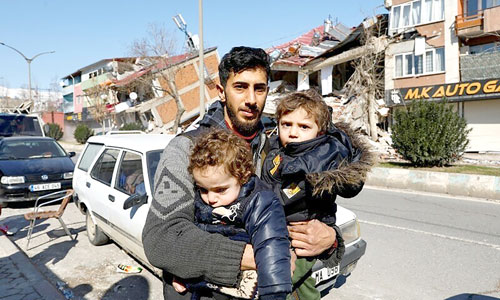Hopes were fading on Thursday for rescuing survivors of the earthquake in Turkiye and Syria, which has killed over 17,500 people in one of the deadliest tremors in decades.
Bitter cold has hampered the four-day search of thousands of flattened buildings and the 72-hour mark that experts consider the most likely period to save lives has passed.
Relatives were left scouring body bags laid out in a hospital car park in Turkiye’s southern city of Antakya to search for missing relatives — an indication of the scale of the tragedy.
“We found my aunt but not my uncle,” said Rania Zaboubi, a Syrian refugee who lost eight members of her family, as other survivors sought loved ones’ bodies among the corpses.
The 7.8-magnitude quake struck as people slept early Monday in a region where many people had already suffered loss and displacement due to Syria’s civil war.
An official at the Bab al-Hawa border crossing told AFP that an aid convoy reached rebel-held northwestern Syria on Thursday, the first since the earthquake that has left survivors sleeping outdoors due to aftershock risks.
A decade of civil war and Syrian-Russian aerial bombardment had already destroyed hospitals, collapsed the economy and prompted electricity, fuel and water shortages.
Temperatures in the Turkish city of Gaziantep plunged to minus five degrees Celsius early Thursday, but thousands of families spent the night in cars and makeshift tents — too scared or banned from returning to their homes.
Parents walked the streets of the city — close to the epicentre of Monday’s earthquake — carrying their children in blankets because it was warmer than sitting in a tent.
Some people have found sanctuary with neighbours or relatives. Some have left the region. But many have nowhere to go.
Gyms, mosques, schools and some stores have opened up at night. But beds are still at a premium and thousands spend the nights in cars with engines running to provide heat. “When we sit down, it is painful and I fear for anyone who is trapped under the rubble in this,” said Melek Halici, who wrapped her two-year-old daughter in a blanket as they watched rescuers working into the night.—AP










